- Home
- Mack Reynolds
The Second Pulp Crime Page 9
The Second Pulp Crime Read online
Page 9
“Did you know Graham’s wife?” she asked suddenly.
“Which one?” I said.
“The last one. Number three, I think.”
“It doesn’t matter. There was no purpose in my asking for the distinction. I didn’t know number three, or two, or one. Graham Markley’s wives and I didn’t move in the same circles.”
“I thought perhaps you might have met her professionally.”
“As an employer or subject of investigation?”
“Either way.”
“Neither, as a matter of fact. And if I had, I couldn’t tell you.”
“Ethics? I heard that about you. Someone told me you were honorable and discreet. I believe it.”
“Thanks. Also thanks to someone.”
“That’s why I called you. I’m glad now that I did.”
“I know. You like my looks, and I like yours. We admire each other.”
“Are you always so flippant?”
“Scarcely ever. The truth is, I’m very serious, and I take my work seriously. Do you have some work for me to do?”
She swallowed some more of her tonic and held the glass in her lap with both hands. Her expression was again rather darkly brooding, and she seemed for a moment uncertain of herself.
“Perhaps you won’t want the job,” she said.
I nodded. “It’s possible.”
“We’ll see.” She swallowed more of the tonic and looked suddenly more decisive. “Do you remember what happened to Graham’s third wife?”
“I seem to remember that she left him, which wasn’t surprising. So did number one. So did number two. Excuse me if I’m being offensive.”
“Not at all. You’re not required to like Graham. Many people don’t. I confess that there are times when I don’t like him very much myself. I did like his third wife, however. We were in college together, as a matter of fact. We shared an apartment one year. Her name was Constance Vaughan then. I left school that year, the year we shared the apartment, and we never saw each other again.”
“You mean you never knew her as Mrs. Graham Markley?”
“Yes. I didn’t know she’d married. In college she didn’t seem, somehow, like the kind of girl who would ever marry anyone at all, let alone someone like Graham. That was a good many years ago, of course, and people change, I suppose. Anyhow, it was rather odd, wasn’t it? I came here about a year ago from Europe, where I had been living with my second husband, who is not my husband any longer, and I met Graham and after a while entered into our present arrangement, which is comfortable but not altogether satisfactory, and then I learned that he had been married to Constance, whom I had known all that time ago. Don’t you think that was quite odd?”
“It seems to meet the requirements of the term.”
“Yes. The truth is, it made me feel rather strange. Especially when I discovered that she had simply disappeared about a year before.”
“Disappeared?”
“Simply vanished. She hasn’t been seen since by anyone who knew her here. You’ll have to admit that it’s peculiar. Numbers one and two left Graham and divorced him and tapped him for alimony, which he probably deserved, and this was sensible. It was not sensible, however, simply to disappear without a trace and never sue for divorce and alimony, or even separate maintenance. Do you think so?”
“Off hand, I don’t. There may have been good reasons. Surely an attempt was made to locate her.”
“Oh, yes. Of course. Her disappearance was reported to the police, and they made an effort to find her, but it was kept pretty quiet, and I don’t think anyone tried very hard. Because of the circumstances, you see.”
“No, I don’t see. What circumstances?”
“Well, Constance had a baby. A little boy that got to be almost two years old and died. Constance loved him intensely. That’s the way she was about anyone or anything she loved. Very intense. It was rather frightening, in a way. Anyhow, when the little boy died, she seemed to be going right out of her mind with grief, and Graham was no consolation or comfort, of course, and then she met Regis Lawler. Psychologically, she was just ready for him, completely vulnerable, and she fell in love with him, and apparently they had an affair. To get to the point about circumstances, Regis Lawler disappeared the same night that Constance did, and that’s why no one got too excited or concerned. It was assumed that they’d gone away together.”
“Don’t you believe that they did?”
“I don’t know. I think I do. What do you think?”
“On the surface, it seems a reasonable assumption, but it leaves a lot of loose ends.”
“That’s it. That’s what disturbs me. Too many loose ends. I don’t like loose ends, Mr. Hand. Will you try to tie them up for me?”
“Find out where Constance Markley went?”
“Yes.”
“I’m sorry.”
“You mean you won’t?”
“I mean I probably couldn’t. Look at it this way. The police have far greater facilities for this kind of thing than any private detective, and they’ve tried without success. Or if they did find out where Constance Markley went, it was obviously not police business and was quietly dropped. Either way, I’d be wasting my time and your money to try to find her now.”
“Don’t worry about wasting my money.”
“All right. I’ll just worry about wasting my time.”
“Is it wasted if it’s paid for?”
“That’s a good point. If you want to buy my time for a fee, why should I drag my heels? Maybe I’m too ethical.”
“Does that mean you accept?”
“No. Not yet. Be reasonable, Miss Salem. If Constance Markley and Regis Lawler went off together, they might be anywhere in the country or out of it. The West Coast. South America. Europe. Just about anywhere on earth.”
She finished her tonic, lit a cigarette, and let her head fall slowly against the back of the wicker chair as if she were suddenly very tired. With her eyes closed, the shadows of her lashes on her cheeks, she seemed to be asleep in an instant, except for the thin blue plume of smoke expelled slowly from her lungs. After a few moments, her eyes still closed, she spoke again.
“Why should they do that? Why disappear? Why run away at all? Women are leaving husbands every day. Men are leaving wives. They simply leave. Why didn’t Constance?”
“People do queer things sometimes. Usually there are reasons that seem good to the people. You said Mrs. Markley was an intense sort of person. You said she’d suffered a tragedy that nearly unbalanced her mentally. You implied that she hadn’t been happy with Graham Markley. Maybe she just wanted to go away clean—no connections, no repercussions, nothing at all left of the old life but a man she loved and the few things she’d have to remember because she couldn’t forget.”
“I know. I’ve thought of that, and it’s something that Constance might possibly have done, as I remember her.”
“How do you remember her?”
“Well, as I said, she was intense. She was always excited or depressed, and I could never quite understand what she was excited or depressed about. Ideas that occurred to her or were passed on to her by someone. Impressions and suggestions. Things like that. Little things that would never have influenced most people in the least. She was pretty, in a way, but it took quite a while before you realized it. She had a kind of delicacy or fragility about her, but I don’t believe that she was actually fragile physically. It was just an impression. She didn’t appeal to men, and I never thought that men appealed to her. In the year we lived together, she never went out with a man that I can recall. Her parents had money. That’s why I lived with her. I had practically no money at all then, and she took a fancy to me and wanted to rent an apartment for us, and so she did, and I stayed with her until near the end of the school year. I married a boy who also had money. Never mind me,
though. The point is, we went away from school, and I didn’t see Constance again. She was angry with me and refused to say good-by, I’ve always been sorry.”
“How did she happen to meet and marry Graham Markley?”
“I don’t know. Graham is susceptible to variety in women. Probably her particular kind of intangible prettiness, her fragility, something happened to appeal to him at the time they met. I imagine their marriage was one of those sudden, impulsive things that usually should never happen.”
“I see. How did you learn so much about her? Not back there in the beginning. I mean after she married Markley. About her baby, her affair with Lawler, those things.”
“Oh, I picked up bits from various sources, but most of it I learned from Maria. She was maid to Constance, you see, when Constance and Graham were living together. When I came along and moved into this apartment, I sort of acquired her. Graham still had her and didn’t know what to do with her, so he sent her over to me. Isn’t that strange?”
“Convenient, I’d say. Did Maria see Constance Markley the night of her disappearance?”
“Yes. She helped Constance dress. Apparently she was the last person that Constance spoke to.”
“May I speak with her for a moment?”
“If you wish. I’ll get her.”
CHAPTER 2.
She got up and walked barefooted off the terrace into the black and white tiled room, and I drank the last of my gin and tonic and wished for another, and in about three minutes, not longer, she returned with Maria. She sat down again and told Maria that she could also sit down if she pleased, but Maria preferred to stand. Her small brown face was perfectly composed, and expressionless.
“What do you want me to tell you?” she said.
“I want you to answer a few questions about Mrs. Markley,” I said. “Constance Markley, that is. Will you do that?”
“If I can.”
“Miss Salem says that you saw Mrs. Markley the night she disappeared. Is that so?”
“It’s so. I helped her dress for the evening.”
“Did she go out alone?”
“Yes. Alone.”
“Do you know where she was going?”
“I assumed that she was going to see Mr. Lawler. She didn’t tell me.”
“Did she go to see Mr. Lawler often?”
“Twice a week, maybe. Sometimes more.”
“How do you know? Did she confide in you?”
“More in me than anyone else. She had to talk to someone.”
“I see. Were you devoted to Mrs. Markley?”
“Yes. She was very kind, very unhappy. I pitied her.”
“Because of the death of her child?”
“Partly because of that. I don’t know. She was not happy.”
“Did you approve of her affair with Mr. Lawler?”
“Not approve, exactly. I understood it. She needed a special kind of love. A kind of attention.”
“Mr. Lawler gave her this?”
“He must have given it to her. Otherwise, she wouldn’t have gone on with him. That’s reasonable.”
“Yes, it is. It’s reasonable. And so are you, Maria. You’re a very reasonable woman. Tell me. What was your impression of her the night she disappeared?”
“Pardon?”
“Her emotional state, I mean. Was she depressed? Cheerful?”
“Not depressed. Not cheerful. She was eager. There’s a difference between eagerness and cheerfulness.”
“That’s true. Besides being reasonable, Maria, you are also perceptive. Did she seem excessively agitated in any way?”
“Just eager. She was always eager when she went to see Mr. Lawler.”
“Do you think that Mr. Markley was aware of the relationship between his wife and Lawler?”
“I don’t know. He didn’t show much interest in anything Mrs. Markley did. Not even when the child died.”
“All right. Just one more question. Maria. What time did Mrs. Markley leave here?”
“About eight. Perhaps a few minutes before or after.”
“Thank you, Maria.”
Maria turned her still brown face toward Faith Salem, who smiled and nodded. The maid nodded in return, three times, and went away. Faith Salem stood up abruptly, standing with her legs spread and her hands rammed into the patch pockets of the short white coat.
“Well?” she said.
“It looks hopeless,” I said. “You’d be wasting your money.”
“Perhaps so. If I don’t waste it on you, I’ll waste it on someone else.”
“In that case, it might as well be me.”
“You agree, then? You’ll take the job?”
Looking up at her, I was beginning to feel dominated, which was not good, so I removed the feeling by standing.
“Tentatively,” I said.
“What do you mean, tentatively?”
“I’ll make a preliminary investigation. If anything significant or interesting comes out of it, I’ll go ahead. If not, I’ll quit. You’ll pay my expenses and twenty-five dollars a day. Are those terms acceptable?”
“Yes. I accept.”
“Another thing. I’m to be allowed to talk with whomever I think necessary. Is that also agreed?”
“Yes, of course.” She hesitated, her soft lower lip protruding again in the darkly brooding expression. “You mean Graham, I suppose. I’d prefer, naturally, that he not know whom you’re working for.”
“I won’t tell him unless I think it’s advisable. I promise that much.”
“That’s good enough. I have confidence in your word, Mr. Hand.”
“Ethical. Someone told you, and you believe it, and that’s what I am. I’ll begin my investigation, it you don’t mind, by asking you one more question. What are you afraid of?”
“Afraid? I’m afraid of nothing. I honestly believe that I’ve never been afraid of anything in my life.”
“I’m ready to concede that you probably haven’t. Let me put it differently. What disturbs you about Constance Markley’s disappearance?”
“I’ve explained that. I don’t like loose ends. Graham has asked me to marry him. For my own reasons, I want to accept. First, however, he has to get a divorce. He can get it, I suppose, on grounds of desertion. I only want to know that it really was desertion.”
“That’s not quite convincing. What alternative to desertion, specifically, do you have in mind?”
“You said you would ask one more question, Mr. Hand. You’ve asked two.”
“Excuse me. You can see how dedicated I become to my work.”
“I should appreciate that, of course, and I do. I honestly have no specific alternative in mind. I just don’t like the situation as it stands. There’s another thing, however. I knew Constance, and I liked her, and now by an exceptional turn of events I’m in the position of appropriating something that was hers. I want to know that it’s all right. I want to know where she went, and why she went wherever she did, and that everything is all right there and will be all right here, whatever happens.”
I believed her. I believed everything she told me. She was a woman I could not doubt or condemn or even criticize. If I had been as rich as Graham Markley, I’d have taken her away, later if not then, and I’d have kept her, and there would have been between us, in the end, more than the money which would have been essential in the beginning.
“I’ll see what I can do,” I said. “Do you have a photograph of Constance Markley that I can take along?”
“Yes. There’s one here that Maria brought. I’ll get it for you.”
She went inside and was gone for a few minutes and came back with the photograph. I took it from her and put it into the side pocket of my coat without looking at it. There would be plenty of time later to look at it, and now, in the last seconds
of our first meeting, I wanted to look at Faith Salem.
“Goodbye,” I said. “I’ll see you again in a few days and let you know if I intend to go ahead.”
“Call before you come,” she said.
“Yes,” I said. “Certainly.”
“I’ll see you to the door.”
“No. Don’t bother. You’d better stay here in the sun. In another half hour, it’ll be gone.”
“Yes. So it will.” She looked up at the white disk in the sky beyond a ridge of tooled stone. “Goodbye, then. I’ll be waiting to hear from you.”
She offered me her hand, and I took it and held it and released it. In the middle of the black and white acre, I paused and looked back. She had already removed the short white coat and was lying on her stomach on the yellow pad. Her face was buried in the crook of an elbow.
I went on out and back to my office and put my feet on the desk and thought about her lying there in the sun. There was no sun in my office. In front of me was a blank wall, and behind me was a narrow window, and outside the narrow window was a narrow alley. Whenever I got tired of looking at the wall I could get up and stand by the window and look down into the alley, and whenever I got tired of looking into the alley I could sit down and look at the wall again, and whenever I got tired of looking at both the wall and the alley, which was frequently, I could go out somewhere and look at something else. Now I simply closed my eyes and saw clearly behind the lids a lean brown body interrupted in two places by the briefest of white hiatuses.

 Happy Ending
Happy Ending Space Visitor
Space Visitor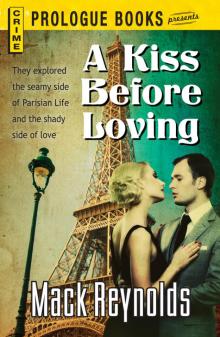 A Kiss Before Loving
A Kiss Before Loving Episode on the Riviera
Episode on the Riviera Planetary Agent X
Planetary Agent X Rolltown bh-3
Rolltown bh-3 The Second Mack Reynolds Megapack
The Second Mack Reynolds Megapack Dawnman Planet up-2
Dawnman Planet up-2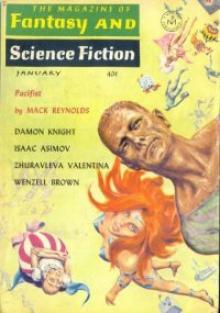 Pacifist
Pacifist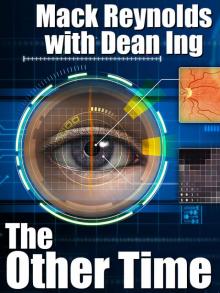 The Other Time
The Other Time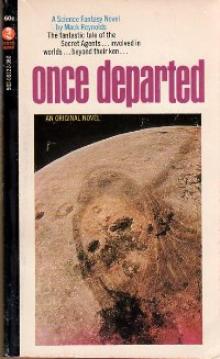 Once Departed
Once Departed IQ
IQ Computer War
Computer War Earth Unaware
Earth Unaware The Rival Rigelians up-3
The Rival Rigelians up-3 Brain World up-7
Brain World up-7 Star Trek - TOS - Mission to Horatius
Star Trek - TOS - Mission to Horatius Amazon Planet up-5
Amazon Planet up-5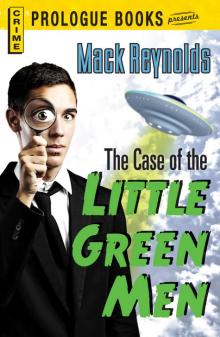 The Case of the Little Green Men
The Case of the Little Green Men Other Time
Other Time The Mack Reynolds Megapack
The Mack Reynolds Megapack Day After Tomorrow
Day After Tomorrow The Devils & Demons MEGAPACK ®: 25 Modern and Classic Tales
The Devils & Demons MEGAPACK ®: 25 Modern and Classic Tales Mission to Horatius
Mission to Horatius Ability Quotient
Ability Quotient Galactic Medal of Honor
Galactic Medal of Honor Trojan Orbit
Trojan Orbit Code Duello up-4
Code Duello up-4 The Fracas Factor
The Fracas Factor The Second Pulp Crime
The Second Pulp Crime Deathwish World
Deathwish World Planetary Agent X up-1
Planetary Agent X up-1 Blackman' Burden na-1
Blackman' Burden na-1 Equality: In the Year 2000 jw-2
Equality: In the Year 2000 jw-2 The Best Ye Breed na-3
The Best Ye Breed na-3 The Jet Set
The Jet Set The Rival Rigelians
The Rival Rigelians The Space Barbarians
The Space Barbarians